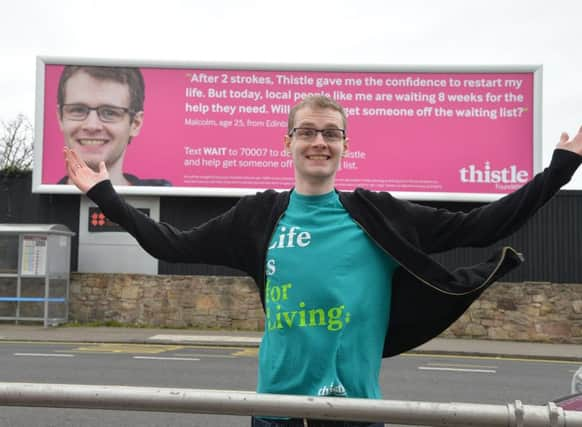Stroke left me helpless at 14, and a charity saved my life says multiple stroke victim


And at 18, while his friends were leaving school and confirming places at college, he suffered another.
When he reached 22, he desperately contacted the health and well-being charity The Thistle Foundation, who placed him on a lifestyle management course after a consultation.
Advertisement
Hide AdAdvertisement
Hide AdThree years later, he now volunteers for Thistle, and his face is on billboards across the city as part of their new fundraising campaign.
Thistle, one of the only Scottish charities that accepts people regardless of their long-term condition, currently has an eight-week waiting list.
Malcolm says this is why the campaign is so vital. “When I reached out to get involved, the only thing that had been stopping me was me. I didn’t have to wait at all, but now a lot of people do,” he said.
“Thistle has been responsible for so much positive change in my life – I feel like if I’d been told I had to wait, I’d have used it as an excuse just leave it. It’s so important that change is available when you need it.”
Advertisement
Hide AdAdvertisement
Hide AdMalcolm was a keen basketball and rugby player when he suffered his first stroke, which left him unable to walk without the use of crutches.
“If you knew me when I was 14, you’d see just a normal lad. I loved my sport – playing basketball and rugby. That all changed overnight. I woke up confused and claustrophobic, confined to a hospital bed. No-one could explain to me or my parents what had caused my stroke. I couldn’t speak. I couldn’t write. I couldn’t walk around, let alone get back on the rugby pitch.”
Malcolm’s second stroke came at a time when all his friends were making plans for their future. While everyone else was moving on with their lives, he couldn’t walk without the aid of a crutch.
He felt isolated and nervous when he first reached out to Thistle but says the course made him realise he had “come to the right place”.
Advertisement
Hide AdAdvertisement
Hide Ad“The first time I came to Thistle, I was a bit nervous, even reluctant, to ask for help. I was worried that they wouldn’t be able to help me. But as soon as I talked to a health and wellbeing practitioner, I knew I’d come to the right place.
“Within a few weeks, I could take tentative steps on my own,” he said. “By the end of the course, I had the confidence to try walking without my crutch. It was an amazing feeling to take those steps on my own.
“Most post-stroke physiotherapy is geared towards older people, but with Thistle the help is geared towards your individual condition. The course didn’t just help me physically, it helped my confidence.
“Being out and about without crutches, I used to think, ‘What if something bad happens?’ But being around other people who were trying to improve themselves really helped me identify what I could do.”
Advertisement
Hide AdAdvertisement
Hide AdThistle was first formed 74 years ago as a charity for ex-servicemen, but it has grown rapidly. Last year, the organisation received more than 700 referrals.
Malcolm is the face of Thistle’s new Stop the Wait fundraiser, launched to reduce their lengthy waiting list, and is getting used to being spotted by friends in public.
“A lot of people have been saying they saw me,” said Malcolm. “They’re like, ‘Was that you on a billboard?’ A lot of them are taking selfies with the billboard and stuff, which is kind of odd. But others have been sending in their own stories, which is great.”
Unsurprisingly, though, he does not see himself as the star of the show. He is also busy on the other side of the camera, shooting and editing promotional videos for the charity.
Advertisement
Hide AdAdvertisement
Hide AdMalcolm developed a love for video and social media when he was first hospitalised as it meant he could “still keep his friends up to date”.
He now says developing his film-making skills is one of his big ambitions.
He said: “I’d quite like to keep the video stuff going. There’s a massive difference in the ones I’ve made this year compared to last year.
“It means I have some responsibilities to break up the routine. I’ve actually developed a skill I didn’t have before I came here. I’ve had help from my brother, who does digital media, but I try to do much of it on my own.
Advertisement
Hide AdAdvertisement
Hide Ad“I’m more willing to try things now – if someone asks me for help, I’ll give it a go, and I hope by doing this campaign I’m giving something back.”
“Our campaign features Malcolm who was just 14 when he had a stroke and 18 when he experienced a second,” said Thistle fundraising manager, William Oviatt.
“It’s great that Malcolm wants to use his story to raise awareness of our work and help reduce Thistle’s waiting list.
“As a charity that relies on the generosity of our supporters to fund this work, we hope that the ‘Stop the Wait’ campaign will allow more local people like Malcolm to get the support they need.”
Advertisement
Hide AdAdvertisement
Hide AdMalcolm is featuring on bus advertising and posters around Edinburgh.
You can donate to the campaign at www.thistle.org.uk, via their Facebook page at @thistlefoundation or by texting WAIT to 70007.